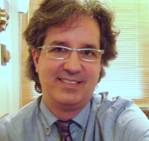|
WORKSHOP - DEPERSONALIZATION DISORDER Sunday, MAY 1, 2011 (Afternoon)
The Phenomenology, Neurobiology, and Neurocognitive Basis of Depersonalization Disorder”
Depersonalization disorder (DPD) is a dissociative disorder characterized by feelings of detachment from one’s mental processes or body, and a pervasive sense of unfamiliarity/unreality and hypo-emotionality, but with intact reality testing. We will discuss neurocognitive studies in DPD that help us better understand the underlying neurobiology of this disorder. Depersonalization may be caused by a fronto-limbic suppressive mechanism – presumably mediated via attention - which manifests subjectively as emotional numbing, and disables the process by which perception and cognition normally become emotionally coloured, giving rise to a subjective feeling of ‘unreality’. Functional neuroimaging and psychophysiological studies will be discussed that support the above model. Although a putative inhibitory mechanism on emotional processing might account for the emotional numbing and characteristic perceptual detachment, it is likely, as suggested by some studies, that parietal mechanisms underpin feelings of disembodiment and lack of agency. Studies of DPD offer unique insight into key issues of identity and first-person experience. The relationship between the quality of subjective experience, particularly emotional experience, and sense of selfhood, will be discussed. Understanding the neural basis of consciousness requires an account of the neurocognitive and neurobiological mechanisms that underlie distortions of self-perception such as those seen in the context DPD.
Heather A. Berlin Mauricio Sierra-Siegert Nick Medford
Heather Berlin, PhD, MPH is an assistant professor of Psychiatry at Mount Sinai School of Medicine, where she also completed an NIMH Postdoctoral Fellowship. She received her doctorate from the University of Oxford, Master of Public Health from Harvard University, and Master’s in Psychology from the New School for Social Research. As a Visiting Assistant Professor at Vassar College and a Visiting Lecturer at the Swiss Federal Institute of Technology/University of Zurich, and Hebrew University of Jerusalem she taught courses on the Neurobiology of Consciousness. Her research aims to discover and further delineate brain-behavior relationships that can contribute to the prevention and treatment of psychiatric disorders and to our understanding of the neural basis of consciousness and dynamic unconscious processes.
Dr Mauricio Sierra-Siegert, MD, PhD is a psychiatrist with an abiding interest in dissociative disorders. After obtaining his PhD from Cambridge University he joined the depersonalization research unit of the Institute of Psychiatry in 1998. He also runs a depersonalization disorder clinic at the Maudsley Hospital. Dr. Sierra has over 40 publications on depersonalization in peered reviewed journals and has recently published a scholarly monograph on the subject: Depersonalization: A New Look at a Neglected Syndrome (Cambridge University Press 2009)
Nick Medford, MD is a senior lecturer in psychiatry at Brighton and Sussex Medical School and a clinical neuropsychiatrist at Hurstwood Park Neurosciences Centre, Sussex, UK. He is also affiliated to the Sackler Centre for Consciousness Science, based at the University of Sussex. His research is concerned with the relationship between psychiatric phenomenology and neurobiology, using functional MRI to probe the biological correlates of unusual experiences that occur in clinical groups. In particular, he is interested in disturbances of selfhood and identity, and how these relate to other areas of psychopathology.
The half day workshops are open to the public; registration required Student $76 Standard $96 ONLINE: TSC TOWARD A SCIENCE OF CONSCIOUSNESS Online Payment System Conference Participants may sign up for optional workshops at any time. General Public - please open a general registration. You may just choose Workshops.
|
|
|||||||||||||



